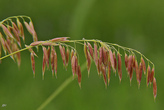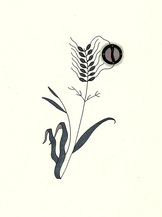This website is dedicated to Giinawind Abinoonjiiyag miinawaa Gichi-aya`aag

Long ago, when we lived on the shores of the Great Salt Water (the Atlantic coastline), the Seven Fires Prophecy was given to us. The First Fire reads: “You will know the chosen ground has been reached when you come to a land where food grows on water.” We then set forth on our Great Migration that began over 500 years ago. We traveled down the St. Lawrence River, into the Great Lakes region, and thence came to Anishinaabe Aki where we found the food that grows on water.
Nenabozho, our Great Uncle, was the first to find manoomin. Hungry, Nenabozho visited his friend Zhiishiib (Duck) for food. Zhiishiib served Nenabozho with manoomin naboob. It was the most delicious naboob Nenabozho had ever eaten. Later, Nenabozho set out to find the food that Zhiishiib had served him. After several days, Nenabozho, hungry, followed a flock of ducks to a lake. He found tall, slender plants growing from the water. “Eat us, Nenabozho,” the plants said. "We're good to eat." Eating some, he realized it was the food Zhiishiib had given him. “What do you call yourselves,” Nenabozho asked the beautiful plants. “We are called manoomin, Nenabozho,” the manoomin aadizookaanag answered.
As Anishinaabeg, we have a duty and responsibility to protect our manoomin. It is is part of our interconnectedness to the Four Orders of Life and in accordance with the original instructions given to us by Gichi-Manidoo (the Creator). When we gather manoomin from the lakes during Manoominike-giizis (Ricing Moon), we always offer asema to the manoomin aadizookaanag to thank them for their gift and sacrifice. This is part of the responsibilites that we have been given. It connects us spirituality to the plant that Gichi-Manidoo provided us with.
Today, our manoomin is endangered. The current wild rice standard is 10 mg/l. Dr, John Moyle, a foremost expert on natural wild rice, stated: There were no large and important and self-perpetuating wild rice stands in Minnesota where sulfate levels exceeded 10mg/l.
Exceeding 10mg/l results in an excessive concentration of sulfates in the sediment where the sulfates convert into hydrogen sulfide. Hydrogen sulfide reduces nutrient uptake by reducing root respiration. The result is withered leaves and smaller seeds. High concentrations suffocate and kill the plant. Sulfate pollutants also lead to methyl mercury that accumulates in fish.
Minnesota legislators are seeking to amend environmental laws that protect our ecosystems. Should these bills become law, extractive resource projects like PolyMet Mining Company’s NorthMet Project near Hoyt Lakes, Minnesota, would be able to discharge levels of sulfate pollution that are currently not allowed – and that will damage and/or wild rice. In addition, there are several other extractive non-ferrous resource colonies who are expected to apply for mining permits in the near future.
Discharges of high levels of sulfate pollution from extractive resource operations is a serious risk to wild rice stands and the northern Minnesota ecosystem. This pollution will impact the ecosystem and cultural practices for the long-term.
This group – Protect Our Manoomin - strongly opposes changes in environmental laws that affect the natural wild rice stands and ecosystem in northern Minnesota. These changes are culturally and ecologically irresponsible. Therefore, we are resolved, as a group of Anishinaabeg, non-Anishinaabeg, and non-Native, to resist any changes that endanger our manoomin. We will protect our manoomin for the present generation to the Seventh Generation...and beyond.
Nenabozho, our Great Uncle, was the first to find manoomin. Hungry, Nenabozho visited his friend Zhiishiib (Duck) for food. Zhiishiib served Nenabozho with manoomin naboob. It was the most delicious naboob Nenabozho had ever eaten. Later, Nenabozho set out to find the food that Zhiishiib had served him. After several days, Nenabozho, hungry, followed a flock of ducks to a lake. He found tall, slender plants growing from the water. “Eat us, Nenabozho,” the plants said. "We're good to eat." Eating some, he realized it was the food Zhiishiib had given him. “What do you call yourselves,” Nenabozho asked the beautiful plants. “We are called manoomin, Nenabozho,” the manoomin aadizookaanag answered.
As Anishinaabeg, we have a duty and responsibility to protect our manoomin. It is is part of our interconnectedness to the Four Orders of Life and in accordance with the original instructions given to us by Gichi-Manidoo (the Creator). When we gather manoomin from the lakes during Manoominike-giizis (Ricing Moon), we always offer asema to the manoomin aadizookaanag to thank them for their gift and sacrifice. This is part of the responsibilites that we have been given. It connects us spirituality to the plant that Gichi-Manidoo provided us with.
Today, our manoomin is endangered. The current wild rice standard is 10 mg/l. Dr, John Moyle, a foremost expert on natural wild rice, stated: There were no large and important and self-perpetuating wild rice stands in Minnesota where sulfate levels exceeded 10mg/l.
Exceeding 10mg/l results in an excessive concentration of sulfates in the sediment where the sulfates convert into hydrogen sulfide. Hydrogen sulfide reduces nutrient uptake by reducing root respiration. The result is withered leaves and smaller seeds. High concentrations suffocate and kill the plant. Sulfate pollutants also lead to methyl mercury that accumulates in fish.
Minnesota legislators are seeking to amend environmental laws that protect our ecosystems. Should these bills become law, extractive resource projects like PolyMet Mining Company’s NorthMet Project near Hoyt Lakes, Minnesota, would be able to discharge levels of sulfate pollution that are currently not allowed – and that will damage and/or wild rice. In addition, there are several other extractive non-ferrous resource colonies who are expected to apply for mining permits in the near future.
Discharges of high levels of sulfate pollution from extractive resource operations is a serious risk to wild rice stands and the northern Minnesota ecosystem. This pollution will impact the ecosystem and cultural practices for the long-term.
This group – Protect Our Manoomin - strongly opposes changes in environmental laws that affect the natural wild rice stands and ecosystem in northern Minnesota. These changes are culturally and ecologically irresponsible. Therefore, we are resolved, as a group of Anishinaabeg, non-Anishinaabeg, and non-Native, to resist any changes that endanger our manoomin. We will protect our manoomin for the present generation to the Seventh Generation...and beyond.
Protect Our Manoomin
(Weweni Ganawendan Gi-Manoomininaan)
Mission Statement and Declaration
Protect Our Manoomin believes that manoomin (wild rice) is a sustenance gift from the Gichi-Manidoo (the Creator). In this respect, the sustenance right to manoomin is sacred and cannot be constrained or recalled by colonial laws, policies, or institutions that impact and imperil the manoomin gitigaanan (natural wild rice stands) and ecosystem in northern Minnesota. We are resolved, as Bamaadizidjig (Anishinaabeg, non-Anishinaabeg, and non-Native peoples), to resist any changes that endanger our manoomin. We seek to create awareness of sulfate and sulfide pollution via mining and its harmful effects on manoomin – a vital cultural, spiritual, and environmental resource. We are guided by the Anishinaabe gete-gikendaasowin (traditional knowledge) of our elders.
Article 1. Inherent Rights of Manoomin
1. As a living being, manoomin has the following inherent rights:
a. the right to life and to exist;
b. the right to be respected;
c. the right to regenerate its bio-capacity and to continue its vital cycles and processes free from human disruptions;
d. the right to maintain its identity and integrity as a distinct, self-regulating and interrelated being;
e. the right to clean, sacred nibi as a source of life;
f. the right to integral health;
g. the right to be free from toxic pollution resulting from sulfide mining;
h. the right to not have its genetic structure modified or disrupted in a manner that threatens its integrity or vital and healthy functioning.
2. Manoomin has the right to a place and to play its role in Omizakamigokwe (Mother Earth) for her harmonious functioning.
Article 2. Obligations of Protect Our Manoomin
1. We believe that manoomin is a sacred being with inherent rights. As such:
a. We oppose sulfide mining that will gravely impact manoomin and the ecosystem of northern Minnesota;
b. We oppose legislative policies that endanger manoomin;
c. We demand recognition of reserved treaty rights that provide protection of manoomin in Anishinaabeg ceded lands affirmed by the Supreme Court and Federal Indian law;
d. We oppose the environmental racism that guides the policies of state agencies favoring mining interests;
e. We demand redress for the environmental injustice committed against the inherent rights of manoomin as stated in Article 1;
f. We oppose the ecocide of Omizakamigokwe.
Article 3. Guiding Principal
We will protect our manoomin for the present generation to the Seventh Generation.
Article 1. Inherent Rights of Manoomin
1. As a living being, manoomin has the following inherent rights:
a. the right to life and to exist;
b. the right to be respected;
c. the right to regenerate its bio-capacity and to continue its vital cycles and processes free from human disruptions;
d. the right to maintain its identity and integrity as a distinct, self-regulating and interrelated being;
e. the right to clean, sacred nibi as a source of life;
f. the right to integral health;
g. the right to be free from toxic pollution resulting from sulfide mining;
h. the right to not have its genetic structure modified or disrupted in a manner that threatens its integrity or vital and healthy functioning.
2. Manoomin has the right to a place and to play its role in Omizakamigokwe (Mother Earth) for her harmonious functioning.
Article 2. Obligations of Protect Our Manoomin
1. We believe that manoomin is a sacred being with inherent rights. As such:
a. We oppose sulfide mining that will gravely impact manoomin and the ecosystem of northern Minnesota;
b. We oppose legislative policies that endanger manoomin;
c. We demand recognition of reserved treaty rights that provide protection of manoomin in Anishinaabeg ceded lands affirmed by the Supreme Court and Federal Indian law;
d. We oppose the environmental racism that guides the policies of state agencies favoring mining interests;
e. We demand redress for the environmental injustice committed against the inherent rights of manoomin as stated in Article 1;
f. We oppose the ecocide of Omizakamigokwe.
Article 3. Guiding Principal
We will protect our manoomin for the present generation to the Seventh Generation.

